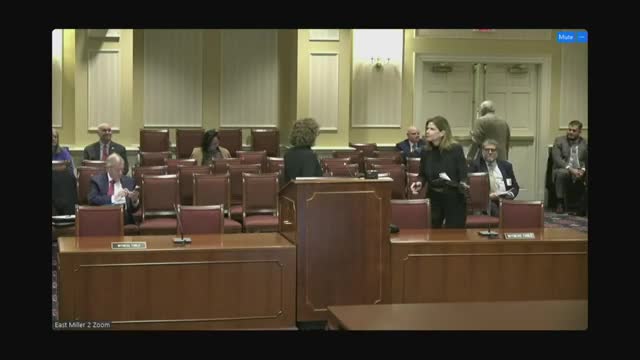Senate Bill 167 aims to strengthen Maryland's anti-SLAPP protections; debate centers on burden shift and exceptions
Get AI-powered insights, summaries, and transcripts
Subscribe
Summary
Sponsor Sen. Shelly Hettleman and civil-rights advocates urged the committee to update Maryland's anti-SLAPP law to shift burdens, add fee-shifting, and speed rulings; opponents and some committee members pushed for targeted clarifications about exceptions and legal standards.
Senate Bill 167 would amend Maryland’s anti-SLAPP law (laws aimed at deterring Strategic Lawsuits Against Public Participation) to make it easier for defendants to obtain early dismissal and fee-shifting when a lawsuit aims to chill protected public participation. Supporters said the current statute’s requirement that defendants demonstrate the plaintiff brought suit in bad faith imposes an onerous burden that defeats the statute’s purpose.
Sen. Shelly Hettleman, sponsor of SB 167, told the Judicial Proceedings Committee the bill would eliminate a unique statutory requirement that defendants show bad faith, allow fee shifting to deter lawsuits intended to chill speech, and require courts to rule promptly with limited discovery on anti‑SLAPP motions. Hettleman cited recent SLAPP-style litigation in Baltimore and other jurisdictions and said the measure aligns Maryland with reforms adopted in other states.
Tom Cole, an attorney who testified in his personal capacity, described representing a client who was sued after blogging about a referendum petition and said the existing statute’s vagueness denied an efficient procedural mechanism to dismiss a suit meant to silence public participation. Katie O’Malley of the Women’s Law Center said victims of intimate-partner violence and others who participate in public proceedings can be targets of SLAPP suits and urged the committee to support the bill.
During questioning, senators raised multiple technical concerns. Several committee members asked whether shifting the burden away from proving the plaintiff’s bad-faith motive would raise the risk of dismissing meritorious claims or create a loophole for powerful actors to avoid accountability. Proponents said the bill retains protections: the plaintiff can demonstrate the suit is justified in law and fact, and the bill includes reciprocal fee-shifting to deter frivolous anti‑SLAPP motions. Opponents, including Maryland Right to Life, argued the bill could broaden exceptions and weaken the current protections against frivolous suits.
Senators asked sponsors and proponents to provide case law and memoranda illustrating how the reform operates in other states and to identify how Maryland courts have interpreted terms such as "bad faith" and "substantial justification in law and fact." Proponents and some judges who spoke in committee said courts around the country have used similar procedures successfully and noted evolving model statutes and judicial orders in other jurisdictions.
No vote was recorded at the hearing. The committee engaged substantively on burden, standards, and drafting choices and asked proponents to provide precedent and drafting clarifications for follow-up work.
